英语语法精讲--形容词和副词
- 格式:pdf
- 大小:177.93 KB
- 文档页数:3
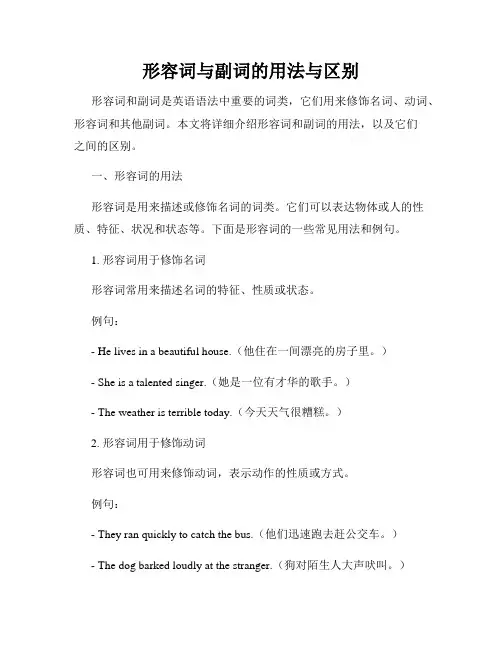
形容词与副词的用法与区别形容词和副词是英语语法中重要的词类,它们用来修饰名词、动词、形容词和其他副词。
本文将详细介绍形容词和副词的用法,以及它们之间的区别。
一、形容词的用法形容词是用来描述或修饰名词的词类。
它们可以表达物体或人的性质、特征、状况和状态等。
下面是形容词的一些常见用法和例句。
1. 形容词用于修饰名词形容词常用来描述名词的特征、性质或状态。
例句:- He lives in a beautiful house.(他住在一间漂亮的房子里。
)- She is a talented singer.(她是一位有才华的歌手。
)- The weather is terrible today.(今天天气很糟糕。
)2. 形容词用于修饰动词形容词也可用来修饰动词,表示动作的性质或方式。
例句:- They ran quickly to catch the bus.(他们迅速跑去赶公交车。
)- The dog barked loudly at the stranger.(狗对陌生人大声吠叫。
)3. 形容词用于修饰代词形容词也可以修饰代词,描述代词所指的人或事物。
例句:- This book is interesting.(这本书很有趣。
)- I don't like that color.(我不喜欢那个颜色。
)- She can't solve this difficult problem.(她无法解决这个难题。
)二、副词的用法副词是一种修饰动词、形容词、副词和整个句子的词类。
它们描述动作的方式、时间、地点、程度等。
下面是有关副词的一些常见用法和例句。
1. 副词用于修饰动词副词通常用来修饰动词,描述动作如何发生。
例句:- He speaks loudly.(他大声说话。
)- She sings beautifully.(她唱得很漂亮。
)- They walked slowly along the beach.(他们沿着海滩慢慢地走。
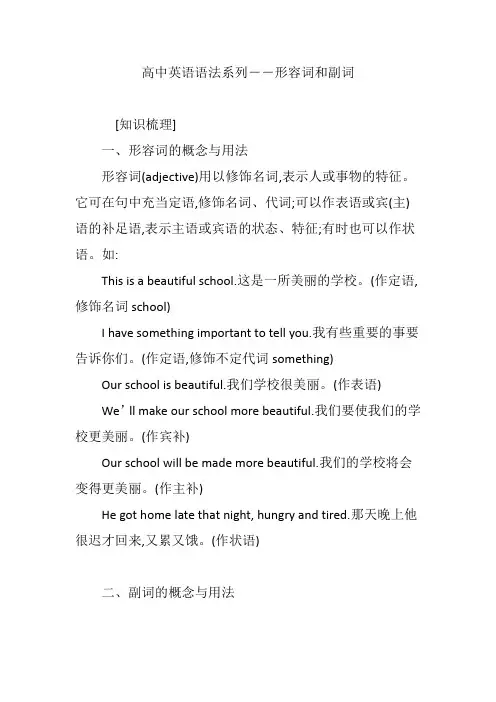
高中英语语法系列――形容词和副词[知识梳理]一、形容词的概念与用法形容词(adjective)用以修饰名词,表示人或事物的特征。
它可在句中充当定语,修饰名词、代词;可以作表语或宾(主)语的补足语,表示主语或宾语的状态、特征;有时也可以作状语。
如:This is a beautiful school.这是一所美丽的学校。
(作定语,修饰名词school)I have something important to tell you.我有些重要的事要告诉你们。
(作定语,修饰不定代词something)Our school is beautiful.我们学校很美丽。
(作表语)We’ll make our school more beautiful.我们要使我们的学校更美丽。
(作宾补)Our school will be made more beautiful.我们的学校将会变得更美丽。
(作主补)He got home late that night, hungry and tired.那天晚上他很迟才回来,又累又饿。
(作状语)二、副词的概念与用法副词(adverb)用以修饰动词、形容词或其它副词。
它在句中主要作状语,个别副词也可作表语、定语、或宾(主)语补足语。
He studies hard.他学习很努力。
(作状语,修饰动词)I’m terribly sorry for being late. 非常抱歉,我迟到了。
(作状语,修饰形容词)This coat fits him very well.这件上衣他穿着很合适。
(作状语,修饰副词)The people here are kind to us.这里的人对我们很好。
(作定语,修饰The people)When will you be back? 你什么时候回来?(作表语)三、形容词与副词的转换有的形容词加上ly后可转换成副词,规则如下:注意:friendly, motherly, lovely等词虽然以ly结尾,但不是副词,而是形容词。
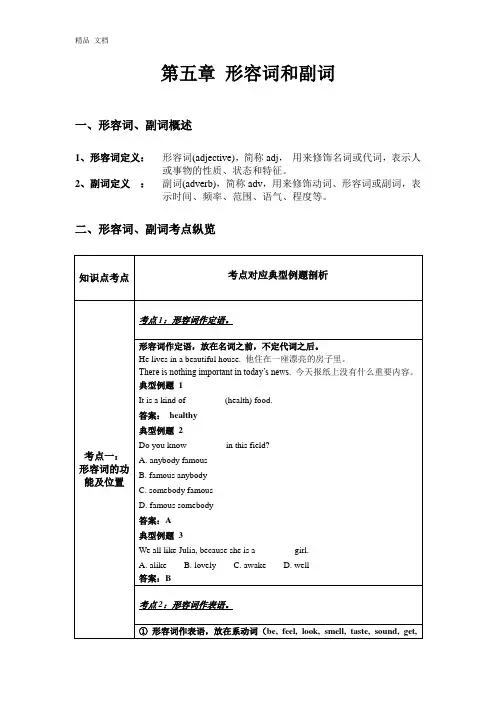
第五章形容词和副词一、形容词、副词概述1、形容词定义:形容词(adjective),简称adj,用来修饰名词或代词,表示人或事物的性质、状态和特征。
2、副词定义:副词(adverb),简称adv,用来修饰动词、形容词或副词,表示时间、频率、范围、语气、程度等。
二、形容词、副词考点纵览三、综合练习( )1. –If you don’t like the red coat, how about the green one?–OK, but do you have _______ size in green? This one is a bit small for me.A. a bigB. a biggerC. the bigD. the bigger( )2. –Mum, I think I’m _______ to get back to school.–Not really, my dear. You’d better stay at home for anoth er day or two.A. so wellB. so goodC. well enoughD. good enough ( )3. –What delicious cakes! –They will taste _______ with butter.A. goodB. betterC. badD. worse( )4. –Mr. Zhou , of all the students in our group, who lives _______ ?–I think Li Lei does.A. farB. fartherC. farthestD. the farther( )5. With a history of more than 1,400 years, ZhaoZhou Bridge is the _______ stone arch bridge in the world .A. oldB. olderC. oldestD. elder( )6. Bob never does him homework _______ Mary. He makes lots of mistakes.A. so careful asB. as carefully asC. carefully asD. as careful as ( )7. A: How can I speak English _______ you?B: You’d better speak more, I think.A. as good asB. more thanC. as well asD. as much as( )8. Your English is good. I’ll try my best to speak it as _______you do.A. clearly asB. clear asC. clearer thanD. more clearly ( )9. –Is your mother badly ill?–No, _______ , only a little cold.A. serious anythingB. serious nothingC. nothing seriousD. anything serious( )10. I’m not sure if I’m going to Tim’s party; I may go to the concert _______ .A. onlyB. insteadC. earlyD. late( )11. Although they are brothers, they are the _______ opposite of one another.A. veryB. justC. fewD. little( )12. The new Bright Restaurant is _______ than the old one. Moore and more people like to eat there.A. goodB. betterC. badD. worse( )13. Wang Ping does _______ in physics that I missed the first class.A. badlyB. Most badlyC. worseD. worst( )14. I got up so _______ this morning that I missed the first class.A. earlyB. lateC. quietlyD. neatly( )15. –Do you enjoy traveling by plane?–No. It’s _______ expensive.A. much moreB. more muchC. too muchD. much too( )16. I’m afraid the headmaster is _______ busy to meet the visitors.A. too muchB. much tooC. so muchD. much too( )17. How beautifully she sings! I’ve never heard _______ .A. the better voiceB. a good voiceC. the best voiceD. a better voice( )18. You do well in your lessons. I’m _______ you will pass the exam.A. sureB. afraidC. sadD. sorry( )19. –Who is _______ in your class?–Fred.A. tallB. tallerC. tallestD. the tallest( )20. –What do you think of the football match?–Wonderful! The Chinese football team has never played _______ .A. betterB. bestC. worseD. worst( )21. The population of China is _____ than _____ of any other country in the world.A. larger , the oneB. more , thatC. larger , thatD. more , the one ( )22. There is much wine here, but _______ people want to drink it.A. manyB. a littleC. fewD. a few( )23. People speak ______ of the film Not One Less. It is really necessary for every child to go to school.A. loudB. loudlyC. highD. highly( )24. She always finishes her homework on time. She ______ leaves it for tomorrow.A. alwaysB. neverC. usuallyD. sometimes( )25. The football match was _______, so the boys were _______ about it.A. excited , excitingB. exciting, excitedC. excited , excitedD. exciting , exciting( )26. Playing table tennis isn’t difficult. You can learn it _______.A. easyB. easilyC. quickD. hardly( )27. We Chinese always put our family name _______.A. lastB. nearlyC. firstD. in the middle ( )28. This kind of T-shirt look _______ and sells _______ in the market.A. nice, goodB. well , wellC. nice , wellD. good , nice( )29. The light in the room wasn’t _______ for me to read.A. brightly enoughB. enough brightlyC. enough brightD. bright enough( )30. –Look, this digital camera is really cheap! It’s only five hundred yuan.–The _______ , the better. I’m short _______ money, you know.A. cheaper , ofB. cheap, forC. expensive , ofD. more expensive , for( )31. Which subject do you like _______ , math, Chinese or English?A. betterB. bestC. wellD. very much( )32. _______ little water is not enough for _______ many people.A. Such , soB. So , soC. Such , suchD. So , such( )33. English is spoken by _______ people.A. a lotB. much manyC. a large number ofD. a great deal of ( )34. –Isn’t that Mary?–Yes, she always has a(an) _______ smile on her face.A. aloneB. kindlyC. ownD. friendly( )35. –Do you prefer music to drawing?–No. I like drawing _______.A. wellB. mostC. betterD. best( )36. Since China has been a member of the WTO, English is ______ useful than before.A. moreB. mostC. muchD. very( )37. Can you speak a little louder? I can _______ hear you.A. hardB. reallyC. hardlyD. clearly( )38. China has a _______ population and long history.A. manyB. largeC. muchD. big( )39. Do you have _______ to say?A. important anythingB. anything importantC. important somethingD. something important( )40. Which is _______ , English or Chinese?A. interestingB. interestingerC. more interestingD. most interesting( )41. –The TV programme is boring. Shall we play chess intead?–All right. That is _______ than watching a boring programme.A. very goodB. much goodC. very betterD. much better( )42. –Mum, could you buy me a dress like this?–Certainly, we can buy _______ one than this, but _______ this.A. a better, better thanB. a worse , as good asC. a cheaper , as good asD. a more important , not as good as ( )43. Let’s enjoy the song Yesterday Once More. It sounds _______.A. wellB. sadlyC. niceD. bad( )44. –Is the physics problem _______ ?–Yes. I can work it out _______.A. easy , easilyB. easy, easyC. easily , easyD. easily , easily ( )45. Hainan is a very large island. It’s the second _______ island in China.A. largeB. largerC. largerD. most large( )46. What a _______ cough! You seem _______ ill.A. terrible, terriblyB. terribly , terribleC. terrible , terribleD. terribly , terribly ( )47. I’m not sure whether Mary can sing _______ Mabel.A. as well asB. as good asC. so good asD. as better as( )48. Chinese is _______ more difficult than English.A. mostB. veryC. manyD. much( )49. The _______ old man told his son to be a good boy.A. diedB. deadC. dyingD. death( )50. Today my sister is feeling _______ to go to the factory.A. enough goodB. good enoughC. well enoughD. enough well参考答案精品文档1—5 B C B C C6—10 B C A C B11—15 A B D B D16—20 B D A D A21—25 C C D B B26—30 B C C D A31—35 B B C D C36—40 A C B B C文档说明(Word文档可以删除编辑)专注于精品文档:中考、高考、数学语文英语试卷、高中复习题目、小学试卷教案合同协议施工组织设计、期中、期末等测试,本文档目的是为了节省读者的工作时间,提高读者的工作效率,读者可以放心下载文档进行编辑使用.文档来源网络改编,审核有可能疏忽,如果有错误或侵权,请联系本店马上删除。


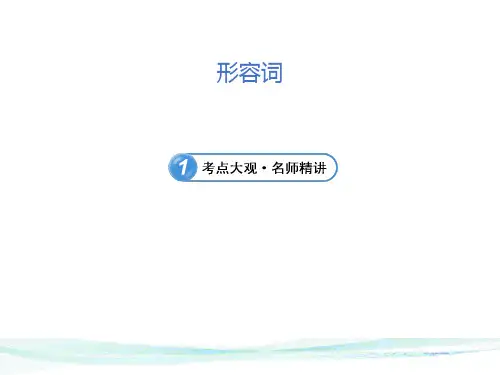
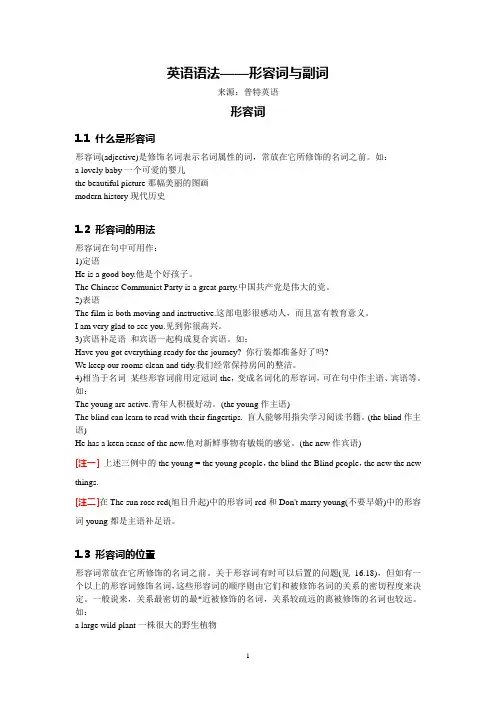
英语语法——形容词与副词来源:普特英语形容词1.1 什么是形容词形容词(adjective)是修饰名词表示名词属性的词,常放在它所修饰的名词之前。
如:a lovely baby一个可爱的婴儿the beautiful picture那幅美丽的图画modern history现代历史1.2 形容词的用法形容词在句中可用作:1)定语He is a good boy.他是个好孩子。
The Chinese Communist Party is a great party.中国共产党是伟大的党。
2)表语The film is both moving and instructive.这部电影很感动人,而且富有教育意义。
I am very glad to see you.见到你很高兴。
3)宾语补足语和宾语一起构成复合宾语。
如:Have you got everything ready for the journey? 你行装都准备好了吗?We keep our rooms clean and tidy.我们经常保持房间的整洁。
4)相当于名词某些形容词前用定冠词the,变成名词化的形容词,可在句中作主语、宾语等。
如:The young are active.青年人积极好动。
(the young作主语)The blind can learn to read with their fingertips. 盲人能够用指尖学习阅读书籍。
(the blind作主语)He has a keen sense of the new.他对新鲜事物有敏锐的感觉。
(the new作宾语)[注一]上述三例中的the young = the young people,the blind the Blind people,the new the new things.[注二]在The sun rose red(旭日升起)中的形容词red和Don't marry young(不要早婚)中的形容词young都是主语补足语。


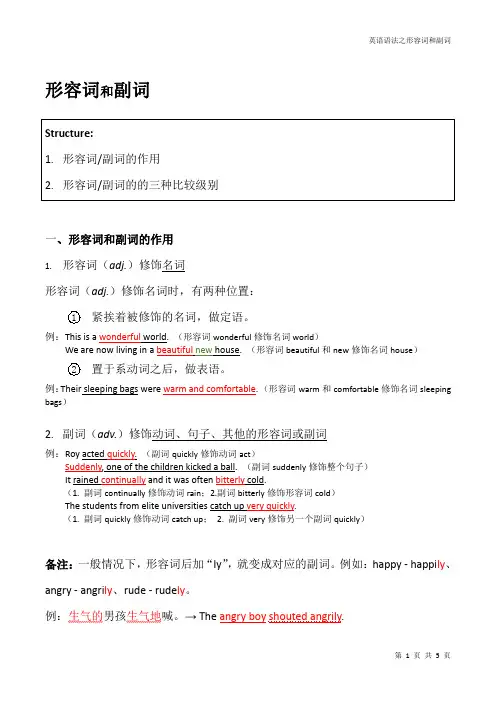
形容词和副词一、形容词和副词的作用1.形容词(adj.)修饰名词形容词(adj.)修饰名词时,有两种位置:1紧挨着被修饰的名词,做定语。
例:This is a wonderful world.(形容词wonderful修饰名词world)We are now living in a beautiful new house.(形容词beautiful和new修饰名词house)2置于系动词之后,做表语。
例:Their sleeping bags were warm and comfortable.(形容词warm和comfortable修饰名词sleeping bags)2.副词(adv.)修饰动词、句子、其他的形容词或副词例:Roy acted quickly.(副词quickly修饰动词act)Suddenly,one of the children kicked a ball.(副词suddenly修饰整个句子)It rained continually and it was often bitterly cold.(1.副词continually修饰动词rain;2.副词bitterly修饰形容词cold)The students from elite universities catch up very quickly.(1.副词quickly修饰动词catch up;2.副词very修饰另一个副词quickly)备注:一般情况下,形容词后加“ly”,就变成对应的副词。
例如:happy-happi ly、angry-angri ly、rude-rude ly。
例:生气的男孩生气地喊。
→The angry boy shouted angrily.二、形容词和副词的比较级形容词和副词的比较级分为:1)最高级(最...)2)比较级(更...)3)原级比较(一样...)1.形容词/副词的最高级:the+adj./adv.的最高级(+介词短语,表示比较的范围)“(...范围内)最...”,通常用于三者或以上的比较例:My younger sister is the tallest one in her class.(最高级变化形式:adj./adv.+est)The most serious problem of the project is the lack of power.(最高级变化形式:adj./adv.前加the most)注意:the+adj./adv.的最高级(+in+地点、场所)the+adj./adv.的最高级(+of+比较的对象)例:He is the tallest in our class.He is the tallest of all the students.练习:1)Which is the longest river____the world?2)This is the finest picture____them all.3)This stereo is the most expensive____all the ones in the shop.4)He is the best boxer____our town.答案:in;of;of;in2.形容词/副词的比较级:adj./adv.的比较级(+than+比较的对象)“(和...相比)更...”通常用于两者之间的比较例:I am taller than you.(比较级变化形式:adj./adv.+er)Air tickets are more expensive than train tickets.(比较级变化形式:adj./adv.前加more)Sometimes machines can perform better than human beings.(good比较级的不规则变化:better)注意:比较的对象要一致。
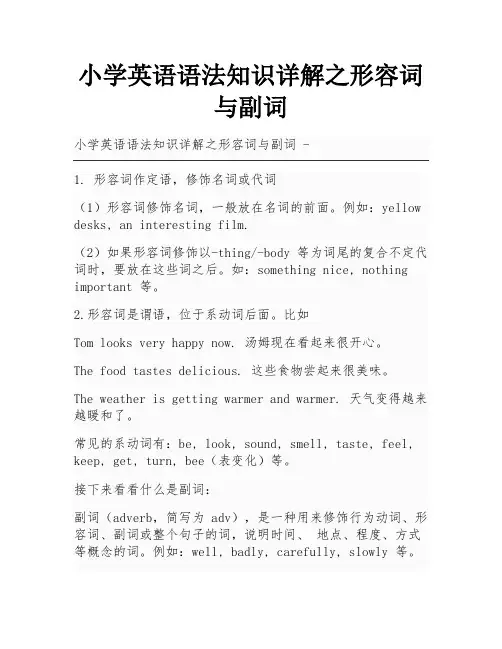
小学英语语法知识详解之形容词与副词1. 形容词作定语,修饰名词或代词(1)形容词修饰名词,一般放在名词的前面。
例如:yellow desks, an interesting film.(2)如果形容词修饰以-thing/-body 等为词尾的复合不定代词时,要放在这些词之后。
如:something nice, nothing important 等。
2.形容词是谓语,位于系动词后面。
比如Tom looks very happy now. 汤姆现在看起来很开心。
The food tastes delicious. 这些食物尝起来很美味。
The weather is getting warmer and warmer. 天气变得越来越暖和了。
常见的系动词有:be, look, sound, smell, taste, feel, keep, get, turn, bee(表变化)等。
接下来看看什么是副词:副词(adverb,简写为 adv),是一种用来修饰行为动词、形容词、副词或整个句子的词,说明时间、地点、程度、方式等概念的词。
例如:well, badly, carefully, slowly 等。
(对于什么是副词,也同样是运用跟汉语相联系的办法,前面说形容词就是带“的”的词,那么副词就是带“地”或者“得”的词了,我们知道在汉语中带“地”的词后面都是接动词,也就意味着英语中汉语解释带“地”的词也是用来修饰动词的,这样既可以很好的理解什么是副词也能顺便把副词的基本用法了解了,一举两得。
对于带“得”的词,在汉语中一般是接形容词的,比如说:开心得不得了,可以看得出“开心”是形容词,而“不得了”是修饰开心的程度的,于是中文含义带有“得”的词就是副词,且是用来修饰形容词或者副词的程度的)副词的分类方式副词: 表示动作和状态的进行和存在方式、方法,如:carefully, suddenly, fast, well, politely,但friendly lovely, lonely, lively elderly, ugly 为形容词程度副词: 多用来修饰形容词和副词,如:very ,much,enough,almost,rather,so,too,still,quite地点副词:here ,there ,everywhere, anywhere, home, upstairs, downstairs 等时间副词:tomorrow, now, today, then, yesterday, tonight 等频度副词:always,usually,often,never,sometimes,seldom,once,rarely,hardly 等疑问副词:why, when, where, how(引导特殊疑问句) how often, how long ,how soon, how much, how many 等关系副词:when, where, why (用于定语从句)其他also,either,too,only,perhaps(对于疑问副词和关系副词,小学不用做要求,认识就行!)接下来看看副词的基本用法:(1)修改行为动词以显示动作是如何执行的。
形容词和副词的区别与用法形容词和副词是英语语法中两种重要的词类,它们都可以用来修饰名词、动词、形容词和其他副词,但在具体用法上有一些区别。
本文将详细介绍形容词和副词的区别与用法。
一、形容词的定义和用法形容词是一种用来描述或限定名词的词类,在句子中通常位于名词之前。
形容词可以使句子更加生动、具体,帮助表达人物、事物的特征和性质。
1. 形容词的基本用法:形容词一般用于以下几种情况:(1)修饰名词:例如,a beautiful flower(一朵美丽的花)。
(2)作表语:例如,The weather is hot today.(今天天气很热)。
(3)作定语:例如,She is a talented musician.(她是一位有才华的音乐家)。
2. 形容词的比较级和最高级:形容词可以通过比较级和最高级来表达不同程度的比较。
一般情况下,形容词的比较级在词尾加-er,最高级在词尾加-est。
例如:big(大)→ bigger(更大)→ biggest(最大)。
3. 形容词的修饰顺序:多个形容词修饰同一个名词时,它们的顺序是有规律的。
通常,形容词的顺序是:冠词、观点或态度、大小、形状、年龄、颜色、国籍或来源、材料或用途、类别等。
例如:a beautiful small round glass bowl (一只漂亮的小圆玻璃碗)。
二、副词的定义和用法副词是一种用来修饰动词、形容词、其他副词和整个句子的词类,用来表达时间、地点、方式、程度等概念。
1. 副词的基本用法:副词可以用于以下几种情况:(1)修饰动词:例如,She sings beautifully.(她唱得很好听)。
(2)修饰形容词:例如,The movie is extremely interesting.(这部电影非常有趣)。
(3)修饰其他副词:例如,He speaks very slowly.(他说话非常慢)。
2. 副词的比较级和最高级:和形容词类似,副词也可以通过比较级和最高级来表达不同程度的比较。
形容词、副词考点聚焦和精讲【中考形容词、副词考点聚焦】一形容词的功能和位置1.说明人或事物的性质或特征的词叫形容词。
形容词在句中只要用作定语、表语、宾语补足语和状语。
2. 多个形容词作定语时的排序There is a small old black wooden desk in my room. 在我的房间里有一个又小又旧的黑色木桌。
His living room is decorated with a large green Chinese carpet. 他的起居室里装饰着绿色的中国大地毯。
3. the加上某些形容词相当于名词,表示一类人或事物The poor are very happy, but the rich are sad. 穷人高兴,但是富人悲伤。
4. 以-ly结尾的形容词5. 只能作表语的形容词:6. 只能作定语的形容词:7. 既可做形容词又可做副词的词8. 形容词与名词的转换:(1)名词加后缀变为形容词。
(2)形容词加后缀变为名词。
9. -ing形容词和-ed形容词的比较:-ing形容词表示主动意义,多修饰事或物,多指事物影响到人,意为“使人(感到)……的”;而-ed 形容词往往带有被动含义,修饰人,多指人受到事物的影响,意为“感到……的”,常用于“sb.+ -ed形容词”结构,有时也做定语用。
10. 形容词常用句型:二常用易混形容词用法辨析:(1)whole与all的用法辨析:记住两个词序:① the whole +名词;①all (of) the +名词。
如:He was busy the whole morning.He can remember all the words he learns.(2)tall与high, short与low用法辨析:指人的个子时用tall与short;指其他事物时一般用high 与low。
He’s very tall/short. // A few people live on high mountains.Tall trees are standing on both sides of that avenue.(3)real与true的用法辨析:real一般指东西的真假,意为“真的”;而true则指事情或消息的可靠性,意为“真实的”。